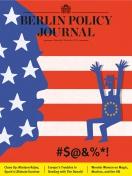The election of Donald Trump as the 45th president of the United States is a watershed moment for transatlantic relations. This was by no means the preferred outcome for most Europeans, and it poses paramount challenges for the transatlantic partnership. Europe is in a state of shock – a shock that feels all too familiar. Many here have been reminded of the Brexit vote, when they went to bed with spirits high and woke up to a new reality. They aren’t ready to accept that the seemingly unthinkable has happened once again. Most Europeans find it difficult to believe that almost half of the American electorate opted for a candidate who bragged about sexually assaulting women, threatened to imprison his opponent, disparaged Latinos and African-Americans, called waterboarding “peanuts,” and vowed to build a “big, beautiful, powerful wall” on the US southern border. Now, Europe’s worst nightmare has come true.
It’s a particularly rude awakening. President Barack Obama’s foreign policy program resonated well with European foreign policy elites, especially Germans. He forged a robust working relationship with Chancellor Angela Merkel – strong enough to weather the storms that battered German-American ties during his tenure, including Guantanamo, Washington’s drone war, and the NSA listening in on Merkel’s cell phone. On Russia, Obama understood the need for transatlantic as well as European unity. On Iran, the US lined up with Europe. And while Obama was pushing European leaders to do more, both in terms of soft power and defense spending, it was always clear that the US was deeply committed to its European partners.
Unknown Knowns
There is little doubt the Trump administration will be different. Nobody knows exactly what the president-elect will do because most of his policies are inscrutable: He has adopted and then abandoned his positions on NATO, Russia, nuclear weapons, Libya, Iraq, Syria, climate change, refugees, and the Iran nuclear deal. If the new president implements only half of his campaign promises, Europe is in deep trouble.
Still, three core principles have emerged as a consistent narrative behind Trump’s candidacy: America is doing too much to try to solve the world’s problems, trade agreements are damaging the country, and immigrants are destructive.
Trump is, in that sense, Merkel’s ideological opposite. She champions globalism, open borders, and dialogue. Trump is skeptical of the very international organizations that Germany sees as linchpins of global diplomacy, from the United Nations to the World Trade Organization and even the European Union itself (Trump welcomed the Brexit vote and referred to his own victory as “Brexit plus plus plus”). At a rally in swing state Ohio, Trump even likened his rival Hillary Clinton, who had explicitly praised Merkel’s leadership style, to the German chancellor: “In short, Hillary Clinton wants to be America’s Angela Merkel, and you know what a disaster this massive immigration has been to Germany and the people of Germany.”
His conciliatory acceptance speech notwithstanding, Trump appears to be a populist nationalist who doesn’t consider Europe’s security or prosperity part of his business. The idea that President Trump will walk back everything candidate Trump said during a bitter, vitriolic campaign is highly doubtful. Some compare him to Ronald Reagan, but it’s very unlikely that he’ll govern in the tradition of internationalist Republicans, from Richard Nixon to George H.W. Bush.
Instead, Europe should gear up for huge challenges. NATO is no longer the safety net it was. Trump has been relentless about Europe’s defense contributions. “They’re not paying us what we need,” he said in his debate with Clinton on September 28, adding, “NATO could be obsolete.” This raises serious questions about Trump’s readiness to uphold America’s Article 5 commitments and its security guarantees in Europe.
This comes at a time when European security is already under threat. The rift between Russia and the West is growing ever deeper, and a series of crises from Morocco to the Caspian Sea have tested Europe’s limits. American disengagement at this point would hit Europe hard. While Hillary Clinton would have almost certainly pushed ahead with the initiatives NATO agreed to at the Warsaw summit last July, that roadmap is now in limbo. Even if America doesn’t withdraw from NATO, Europeans will no longer be able to outsource their foreign, and especially military, responsibilities primarily to Washington. They have to “do more,” with larger contributions not just in terms of soft power but also hard, military capabilities. If Europeans do not step up defense, there might be nobody left to come to their rescue.
Another looming challenge for Europeans will be Trump’s relations with Russia. His apparent admiration for Russian President Vladimir Putin might win him some points with Putin’s remaining friends in Europe, but it could undermine Merkel’s investment in a tough European line on Ukraine. Transatlantic unity was a cornerstone of the Obama administration’s approach and a key tool in deterring Russia. Now it could fray in the process. The Middle East, Turkey, and transatlantic trade are also set to become points of friction.
The Last Wake-Up Call
The postwar world order, built upon seventy years of great power peace and cooperation, is on the brink. And Germany is more crucial than ever. Brexit had already increased the importance of Berlin; the outcome of the American election means Germany’s global responsibility has taken on completely new dimensions.
All eyes are now turning to Berlin to uphold liberal democracy. Meaningful German leadership will be expected not only within Europe, but also on issues like Syria, Iraq, and Russia. It’s entirely unclear whether Germany is ready for the task that lies ahead.
It’s not that Trump has no friends in Europe. Right-wing populists like France’s Marine Le Pen and her Front National, the Netherlands’ Geert Wilders and his Party of Freedom, and the Alternative für Deutschland (AfD) voiced support for Trump during the campaign, and they are celebrating his victory. “Their world sets, ours rises,” Florian Philippot, an adviser to Le Pen, wrote ominously on Twitter. If Obama was “Europe’s President,” Trump may become the president of Europe’s populist far-right. With elections due in Austria, France, the Netherlands, and Germany, there is a real danger that the new US president aligns with these anti-globalism and anti-immigration European forces, further destabilizing the EU.
At the same time, it’s very possible that Trump will trigger anti-American sentiment in Europe and cloud the country’s image abroad, complicating transatlantic relations. However, European leaders will need to try and make it work somehow.
Germany’s chancellor struck the right note when she stressed: “Germany and America are bound by values – democracy, freedom, as well as respect for the rule of law and the dignity of the individual, regardless of their origin, skin color, creed, gender, sexual orientation, or political views”, adding “On the basis of these values, I offer close cooperation to the future president of the United States, Donald Trump.”
In addition to standing up for Western principles, Europe has to get its act together. This is the latest and the loudest in a series of wake-up calls, and no other should be needed. Europe has a large stake in a liberal, rules-based order. It should use every leverage it has to influence decision-making in Washington.
But it would be foolish not to acknowledge that transatlantic relations face an existential threat. The Trump presidency will likely breed mistrust and antagonism on both sides of the Atlantic. Still, four years may feel an eternity, but they are not. Transatlantic relations are simply too important to give up without a good fight.
This article was published in the Berlin Policy Journal, November 2016

